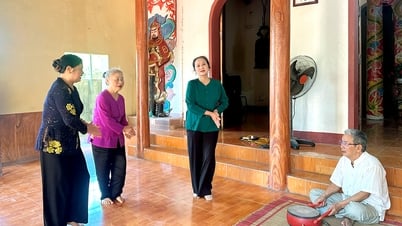Many older people, when they get old, always want to interfere in their children's marriage, thinking that it is good for their children, but often what they do with good intentions is counterproductive.
Mrs. Ly is an example. After her son got married, she could not stand her daughter-in-law's spending habits, so she constantly nagged her son: "Your wife bought new clothes again, she doesn't know how to save money!". Worse, when she and her husband came to visit, the daughter-in-law personally told them: "Mother-in-law, you have to teach your daughter to save money." As a result, the daughter-in-law and son had a big argument, and the son was stuck in the middle and fell into a dilemma.
Parents' excessive concern for their daughter-in-law/son-in-law is actually stepping into a "minefield" because:
- Marriage is a matter between husband and wife, other people's interference will only make things worse. There is a saying "argue at the head of the bed, make up at the foot of the bed", when a young couple has a conflict, let them resolve it themselves. Parents will interfere and make a small problem become a big one;
- The husband/wife's family must respect each other. Don't always think that you can criticize at will because you are the elder. As the saying goes: "What you do not want others to do to you, do not do to others." If you do not want your in-laws to order you about what to do, do not say anything about their children.
-Respect your child's choice. Since they have decided to get married, they have their own way of life. Learning to let go when they are old will make your child more grateful.
Don't be confused about money, help but don't do everything for you
Some old people always think that "my money is my children's money", which not only hurts themselves but also spoils their children.
After retiring, Mr. Truong gave all his pension to his daughter, and helped her pay off her debts and raise her children. At first, his daughter was very grateful, but after a while, she got used to it and asked: "Dad, other parents are also buying new cars for their children, can you help me?" Later, when Mr. Truong got sick and had to be hospitalized, he wanted his daughter to pay for the hospital bills, but his daughter complained: "Don't you have any money? Why do you ask me for money?"
When it comes to money, seniors should adhere to the following principles:
- Save for your own retirement. There is a saying that "raising children is preparing for old age", but a more reliable saying is "having money in hand will make you comfortable". Leave enough money for medical treatment and living expenses that are the responsibility of you and your children.
- Help should be in moderation. You can help when your child is in trouble, but don't become a "cash machine". Like the old saying: "It is better to teach a man to fish than to give him a fish". Teaching children to be independent is more important than giving them money directly.
- Don't use money as a "control tool". Some elders use money to "bind" their children and require them to live according to their wishes, which only distorts family relationships. True love means financial independence and emotional dependence on each other.
Don't always focus on your child's "flaws" and nag.
"A kind word can warm you for three months of winter, while a harsh word can hurt you for six months of summer." Many people, when they get older, like to criticize their children and think, "What's wrong with what I said? It's all for their own good." But they don't realize that these words can hurt their own children.
Phuong's mother was the same. Phuong worked overtime and came home late, her mother complained: "You are so busy with work that you can't find a partner." Phuong wanted to sign up for a class based on her interests, but her mother said: "You are old and still wasting time. You should spend more time making money." After a long time, Phuong would rather work overtime at the company than come home to listen to her mother's nagging.
Always focusing on your child's shortcomings will only hurt both parties:
- Nagging doesn't solve problems. Instead of constantly accusing each other, it's better to talk less and give each other some space.
- Praise your child more. Aseducator Dao Hanh Tri (one of China's most prominent educators and reformers) said: "The secret to educating children lies in believing in them and setting them free." Affirming your child's efforts can build a closer relationship than just finding fault.
- Learn to think from the other person's perspective. Think about when you were a child, you also hated your parents' nagging. Why would you let the same conflict happen to the next generation? Give up the habit of criticism and replace blame with understanding and tolerance, family relationships will become closer.
Conclusion: Maintaining Boundaries is the Greatest Wisdom in Old Age
When you get old, living in harmony with your children and grandchildren is like flying a kite: if the string is too tight, the kite will break; if it is too loose, you fear it will fly away. Learning to not interfere in your children's marriage, not fussing about money, not nagging and blaming is the best way to protect family affection.
Nguyen Phuong (According to giadinh.suckhoedoisong.vn)
Source: http://baovinhphuc.com.vn/Multimedia/Images/Id/128503/Ve-gia-nen-tranh-3-dieu-nay-khi-song-chung-voi-con-cai-du-tinh-cam-co-sau-dam-den-dau




![[Photo] Panorama of the Opening Ceremony of the 43rd Nhan Dan Newspaper National Table Tennis Championship](https://vphoto.vietnam.vn/thumb/1200x675/vietnam/resource/IMAGE/2025/5/19/5e22950340b941309280448198bcf1d9)
![[Photo] Close-up of Tang Long Bridge, Thu Duc City after repairing rutting](https://vphoto.vietnam.vn/thumb/1200x675/vietnam/resource/IMAGE/2025/5/19/086736d9d11f43198f5bd8d78df9bd41)
![[Photo] President Luong Cuong presents the 40-year Party membership badge to Chief of the Office of the President Le Khanh Hai](https://vphoto.vietnam.vn/thumb/1200x675/vietnam/resource/IMAGE/2025/5/19/a22bc55dd7bf4a2ab7e3958d32282c15)
![[Photo] General Secretary To Lam attends the conference to review 10 years of implementing Directive No. 05 of the Politburo and evaluate the results of implementing Regulation No. 09 of the Central Public Security Party Committee.](https://vphoto.vietnam.vn/thumb/1200x675/vietnam/resource/IMAGE/2025/5/19/2f44458c655a4403acd7929dbbfa5039)




















![[Photo] Prime Minister Pham Minh Chinh inspects the progress of the National Exhibition and Fair Center project](https://vphoto.vietnam.vn/thumb/1200x675/vietnam/resource/IMAGE/2025/5/19/35189ac8807140d897ad2b7d2583fbae)
























































![[VIDEO] - Enhancing the value of Quang Nam OCOP products through trade connections](https://vphoto.vietnam.vn/thumb/402x226/vietnam/resource/IMAGE/2025/5/17/5be5b5fff1f14914986fad159097a677)


Comment (0)